- Home
- Deborah Harkness
Shadow of Night Page 12
Shadow of Night Read online
Page 12
“So I am told. Your father sent this to ensure your safe passage.” Joyeuse tossed a gleaming object to Matthew, who caught it neatly. “Philippe de Clermont forgets himself and behaves as though he were the king of France.”
“My father has no need to rule, for he is the sharp sword that makes and unmakes kings,” Matthew said softly. He slid the heavy golden ring over the gloved knuckle of his middle finger. Set within it was a carved red stone. I was sure the pattern incised in the ring was the same as the mark on my back. “Your masters know that if it were not for my father, the Catholic cause would be lost in France. Otherwise you would not be here.”
“Perhaps it would be better for all concerned if the seigneur really were king, given the throne’s present Protestant occupant. But that is a topic for us to discuss in private,” Cardinal Joyeuse said tiredly. He gestured to a servant standing in the shadows by the door. “Take the chevalier’s wife to her room. We must leave you, madame. Your husband has been too long among heretics. An extended period spent kneeling on a cold stone floor will remind him who he truly is.”
My face must have shown my dismay at being alone in such a place.
“Pierre will stay with you,” Matthew assured me before he bent and pressed his lips to mine. “We ride out when the tide turns.”
And that was the last glimpse I had of Matthew Clairmont, scientist. The man who strode toward the door was no longer an Oxford don but a Renaissance prince. It was in his bearing, the set of his shoulders, his aura of banked strength, and the cold look in his eyes. Hamish had been right to warn me that Matthew would not be the same man here. Under Matthew’s smooth surface, a profound metamorphosis was taking place.
Somewhere high above, the bells tolled the hours.
Scientist. Vampire. Warrior. Spy. The bells paused before the final knell.
Prince.
I wondered what more our journey would reveal about this complex man I had married.
“Let us not keep God waiting, Cardinal Joyeuse,” Matthew said sharply. Joyeuse followed behind, as if Mont Saint-Michel belonged to the de Clermont family and not the church.
Beside me, Pierre let out a gentle exhalation. “Milord est lui-même,” he murmured with relief.
Milord is himself. But was he still mine?
Matthew might be a prince, but there was no doubt who was king. With every strike of our horses’ hooves on the frozen roads, the power and influence of Matthew’s father grew. As we drew closer to Philippe de Clermont, his son became more remote and imperious—a combination that put my teeth on edge and led to several heated arguments. Matthew always apologized for his high-handed conduct once his temper came off the boil, and, knowing the stress he was under as we approached his reunion with his father, I forgave him.
After braving the exposed sands around Mont Saint-Michel at low tide and traveling inland, de Clermont allies welcomed us into the city of Fougères and lodged us in a comfortably appointed tower on the ramparts overlooking the French countryside. Two nights later, footmen with torches met us on the road outside the city of Baugé. There was a familiar badge on their livery: Philippe’s insignia of a cross and crescent moon. I’d seen the symbol before when rooting through Matthew’s desk drawer at SeptTours.
“What is this place?” I asked after the footmen led us to a deserted château. It was surprisingly warm for an empty residence, and the delicious smell of cooked food floated through the echoing corridors.
“The house of an old friend.” Matthew pried the shoes off my frozen feet. His thumbs pressed into my frigid soles, and the blood began to return to my extremities. I groaned. Pierre put a cup of warm, spicy wine in my hands. “This was René’s favorite hunting lodge. It was so full of life when he lived here, with artists and scholars in every room. My father manages it now. With the constant wars, there hasn’t been an opportunity to give the château the attention it needs.”
While we were still at the Old Lodge, Matthew and Walter had lectured me on the ongoing struggles between French Protestants and Catholics over who would control the Crown—and the country. From our windows at Fougères, I’d seen distant plumes of smoke marking the Protestant army’s latest encampment, and ruined houses and churches dotted our route. I was shocked by the extent of the devastation.
Because of the conflict, my carefully constructed background story had to change. In England I was supposed to be a Protestant woman of French descent fleeing her native land to save her life and practice her faith. Here it was essential that I be a long-suffering English Catholic. Somehow Matthew managed to remember all the lies and half-truths required to maintain our multiple assumed identities, not to mention the historical details of every place through which we traveled.
“We’re in the province of Anjou now.” Matthew’s deep voice brought my attention back. “The people you meet will suspect you’re a Protestant spy because you speak English, no matter what story we tell them. This part of France refuses to acknowledge the king’s claim to the throne and would prefer a Catholic ruler.”
“As would Philippe,” I murmured. It was not just Cardinal Joyeuse who was benefiting from Philippe’s influence. Catholic priests with hollow cheeks and haunted eyes had stopped to speak with us along the way, sharing news and sending thanks to Matthew’s father for his assistance. None left empty-handed.
“He doesn’t care about the subtleties of Christian belief. In other parts of the country, my father supports the Protestants.”
“That’s a remarkably ecumenical view.”
“All Philippe cares about is saving France from itself. This past August our new king, Henri of Navarre, tried to force the city of Paris to his religious and political position. Parisians chose to starve rather than bow to a Protestant king.” Matthew raked his fingers through his hair, a sign of distress. “Thousands died, and now my father does not trust the humans to sort out the mess.”
Philippe was not inclined to let his son manage his own affairs either. Pierre woke us before dawn to announce that fresh horses were saddled and ready. He’d received word that we were expected at a town more than a hundred miles away—in two days.
“It’s impossible. We can’t travel that far so fast!” I was physically fit, but no amount of modern exercise was equivalent to riding more than fifty miles a day across open countryside in November.
“We have little choice,” Matthew said grimly. “If we delay, he’ll only send more men to hurry us along. Better to do what he asks.” Later that day, when I was ready to weep with fatigue, Matthew lifted me into his saddle without asking and rode until the horses ran themselves out. I was too tired to protest.
We reached the stone walls and timbered houses of Saint-Benoît on schedule, just as Philippe had commanded. By that point we were close enough to Sept-Tours that neither Pierre nor Matthew was much concerned with propriety, so I rode astride. In spite of our adherence to his schedule, Philippe continued to increase the number of family retainers accompanying us, as though he feared we might change our minds and return to England. Some dogged our heels on the roads. Others cleared the way, securing food, horses, and places to stay in bustling inns, isolated houses, and barricaded monasteries. Once we climbed into the rocky hills left by the extinct volcanoes of the Auvergne, we often spotted the silhouettes of riders along the forbidding peaks. After they saw us, they whirled away to carry reports of our progress back to Sept-Tours.
Two days later, as twilight fell, Matthew, Pierre, and I stopped on one of these ragged mountaintops, the de Clermont family château barely visible through swirling gusts of snow. The straight lines of the central keep were familiar, but otherwise I might not have recognized the place. Its encircling walls were intact, as were all six of the round towers, each capped by conical copper roofs that had aged to a soft bottle green. Smoke came from chimneys tucked out of sight behind the towers’ crenellations, the jagged outlines suggesting that some crazed giant with pinking shears had trimmed every wall. There was a snow-covered gard
en within the enclosure as well as rectangular beds beyond.
In modern times the fortress was forbidding. Now, with religious and civil war all around, its defensive capabilities were even more obvious. A formidable gatehouse stood vigil between Sept-Tours and the village. Inside, people hurried this way and that, many of them armed. Peering between snowflakes in the dusky light, I spotted wooden structures dotted throughout the enclosed courtyard. The light from their small windows created oblong cubes of warm color in the otherwise unbroken stretches of gray stone and snow-covered ground.
My mare let out a warm, moist exhalation. She was the finest horse I’d ridden since our first day of travel. Matthew’s present mount was large, inky-colored, and mean, snapping at everyone who got near him save the creature on his back. Both animals came from the de Clermont stables and knew their way home without any direction, eager to reach their oat buckets and a warm stable.
“Dieu. This is the last place on earth I imagined finding myself.” Matthew blinked, slowly, as if he expected the château to disappear before his eyes.
I reached over and rested my hand on his forearm. “Even now you have a choice. We can turn back.” Pierre looked at me with pity, and Matthew gave me a rueful smile.
“You don’t know my father.” His gaze returned to the castle.
Torches blazed all along our approach when at last we entered the gates of Sept-Tours. The heavy slabs of wood and iron were open in readiness, and a team of four men stood silently by as we passed. The gates slammed shut behind us, and two men drew a long timber from its hiding place in the walls to secure the entrance. Six days spent riding across France had taught me that these were wise precautions. People were suspicious of strangers, fearing the arrival of another marauding band of soldiers, a fresh hell of bloodshed and violence, a new lord to please.
A veritable army—humans and vampires both—awaited us inside. Half a dozen of them took charge of the horses. Pierre handed one a small packet of correspondence, while others asked him questions in low voices while sneaking furtive glances at me. No one came near or offered assistance. I sat atop my horse, shaking with fatigue and cold, and searched the crowd for Philippe. Surely he would order someone to help me down.
Matthew noticed my predicament and swung off his horse with enviably fluid grace. In several long strides, he was at my side, where he gently removed my unfeeling foot from the stirrup and rotated it slightly to restore its mobility. I thanked him, not wanting my first performance at SeptTours to involve tumbling into the trampled snow and dirt of the courtyard.
“Which of these men is your father?” I whispered as he crossed under the horse’s neck to reach my other foot.
“None of them. He’s inside, seemingly unconcerned with seeing us after insisting we ride as though the hounds of hell were in pursuit. You should be inside, too.” Matthew began issuing orders in curt French, dispersing the gawking servants in every direction until only one vampire was left standing at the base of a corkscrew of wooden steps that rose to the château’s door. I experienced the jarring sense of past and present colliding when I remembered climbing a not-yet-constructed set of stone steps and meeting Ysabeau for the first time.
“Alain.” Matthew’s face softened with relief.
“Welcome home.” The vampire spoke English. As he approached with a slight hitch in his gait, the details of his appearance came into focus: the salt-and-pepper hair, the lines around his kind eyes, his wiry build.
“Thank you, Alain. This is my wife, Diana.”
“Madame de Clermont.” Alain bowed, keeping a careful, respectful distance.
“It’s a pleasure to meet you, Alain.” We had never met, but I already associated his name with steadfast loyalty and support. It had been Alain that Matthew called in the middle of the night when he wanted to be sure that there was food waiting for me at Sept-Tours in the twenty-first century.
“Your father is waiting,” Alain said, stepping aside to let us pass.
“Have them send food to my rooms—something simple. Diana is tired and hungry.” Matthew handed Alain his gloves. “I’ll see him momentarily.”
“He is expecting both of you now.” A carefully neutral expression settled over Alain’s face. “Do be careful on the stairs, madame. The treads are icy.” “Is he?” Matthew looked up at the square keep, mouth tightening. With Matthew’s hand firmly at my elbow, I had no trouble navigating the stairs. But my legs were shaking so badly after the climb that my feet caught the edge of an uneven flagstone in the entrance. That slip was enough to set Matthew’s temper ablaze.
“Philippe is being unreasonable,” Matthew snapped as he caught me around the waist. “She’s been traveling for days.”
“He was most explicit in his orders, sir.” Alain’s stiff formality was a warning.
“It’s all right, Matthew.” I pushed my hood from my face to survey the great hall beyond. Gone was the display of armor and pikes I’d seen in the twenty-first century. Instead a carved wooden screen helped deflect the drafts when the door was opened. Gone, too, were the faux-medieval decorations, the round table, the porcelain bowl. Instead tapestries blew gently against stone walls as the warm air from the fireplace mingled with the colder air from outside. Two long tables flanked by low benches filled the remaining space, and men and women shuttled between them laying out plates and cups for supper. There was room for dozens of creatures to gather there. The minstrels’ gallery high above wasn’t empty now but crowded with musicians readying their instruments.
“Amazing,” I breathed from between stiff lips.
Cold fingers grasped my chin and turned it. “You’re blue,” Matthew said.
“I will bring a brazier for her feet, and warm wine,” Alain promised. “And we will build up the fires.”
A warmblooded human appeared and took my wet cloak. Matthew turned sharply in the direction of what I knew as the breakfast room. I listened but heard nothing.
Alain shook his head apologetically. “He is not in a good temper.”
“Evidently not.” Matthew looked down. “Philippe is bellowing for us. Are you sure, Diana? If you don’t want to see him tonight, I’ll brave his wrath.”
But Matthew would not be alone for his first meeting with his father in more than six decades. He had stood by me while I’d faced my ghosts, and I would do the same for him. Then I was going to go to bed, where I planned to remain until Christmas.
“Let’s go,” I said resolutely, picking up my skirts.
Sept-Tours was too ancient to have modern conveniences like corridors, so we snaked through an arched door to the right of the fireplace and into the corner of a room that would one day be Ysabeau’s grand salon. It wasn’t overstuffed with fine furniture now but decorated with the same austerity as every other place I’d seen on our journey. The heavy oak furniture resisted casual theft and could sustain the occasional ill effects of battle, as evidenced by the deep slash that cut diagonally across the surface of a chest.
From there Alain led us into the room where Ysabeau and I would one day take our breakfast amid warm terra-cotta walls at a table set with pottery and weighty silver cutlery. It was a far cry from that place in its present state, with only a table and chair. The tabletop was covered with papers and other tools of the secretary. There was no time to see more before we were climbing a worn stone staircase to an unfamiliar part of the château.
The stairs came to an abrupt halt on a wide landing. A long gallery opened up to the left, housing an odd assortment of gadgets, clocks, weaponry, portraits, and furniture. A battered golden crown perched casually on the marble head of some ancient god. A lumpy pigeon’s-blood ruby the size of an egg winked malevolently at me from the crown’s center.
“This way,” Alain said, motioning us forward into the next chamber. Here was another staircase, this one leading up rather than down. A few uncomfortable benches sat on either side of a closed door. Alain waited, patiently and silently, for a response to our presence. When it c
ame, the single Latin word resounded through the thick wood:
“Introite.”
Matthew started at the sound. Alain cast a worried look at him and pushed the door. It silently swung open on substantial, well-oiled hinges.
A man sat opposite, his back to us and his hair gleaming. Even seated it was evident that he was quite tall, with the broad shoulders of an athlete. A pen scratched against paper, providing a steady treble note to harmonize with the intermittent pops of wood burning in the fireplace and the gusts of wind howling outside.
A bass note rumbled into the music of the place: “Sedete.”
Now it was my turn to jump. With no door to muffle its impact, Philippe’s voice resonated until my ears tingled. The man was used to being obeyed, at once and without question. My feet moved toward the two awaiting chairs so that I could sit as he’d commanded. I took three steps before realizing that Matthew was still in the doorway. I returned to his side and grasped his hand in mine. Matthew stared down, bewildered, and shook himself free from his memories.
In moments we had crossed the room. I settled into a chair with the promised wine and a pierced-metal foot warmer to prop up my legs. Alain withdrew with a sympathetic glance and a nod. Then we waited. It was difficult for me but impossible for Matthew. His tension increased until he was nearly vibrating with suppressed emotion.
By the time his father acknowledged our presence, my anxiety and temper were both dangerously close to the surface. I was staring down at my hands and wondering if they were strong enough to strangle him when two ferociously cold spots bloomed on my bowed head. Lifting my chin, I found myself gazing into the tawny eyes of a Greek god.
When I had first seen Matthew, my instinctive response had been to run. But Matthew—large and brooding as he’d been that September night in the Bodleian Library—hadn’t appeared half so otherworldly. And it wasn’t because Philippe de Clermont was a monster. On the contrary. He was, quite simply, the most breathtaking creature I had ever seen—supernatural, preternatural, daemonic, or merely human.
No one could look at Philippe de Clermont and think he was mortal flesh. The vampire’s features were too perfect, and eerily symmetrical. Straight, dark eyebrows settled over eyes that were a pale, mutable golden brown touched with flecks of green. Exposure to sun and elements had touched his brown hair with strands of gleaming gold, silver, and bronze. Philippe’s mouth was soft and sensual, though anger had drawn his lips hard and tight tonight.
Pressing my own lips together to keep my jaw from dropping, I met his appraising stare. Once I did, his eyes moved slowly and deliberately to Matthew.
“Explain yourself.” The words were quiet, but they didn’t conceal Philippe’s fury. There was more than one angry vampire in the room, however. Now that the shock of seeing Philippe had passed, Matthew tried to take the upper hand.
“You commanded me to Sept-Tours. Here I am, alive and well, despite your grandson’s hysterical reports.” Matthew tossed the silver coin onto his father’s oak table. It landed on its edge and whirled on an invisible axis before toppling flat.
“Surely it would have been better for your wife to remain at home this time of year.” Like Alain, Philippe spoke English as flawlessly as a native.
“Diana is my mate, Father. I could hardly leave her in England with Henry and Walter simply because it might snow.”
“Stand down, Matthew,” Philippe growled. The sound was as leonine as the rest of him. The de Clermont family was a menagerie of formidable beasts. In Matthew’s presence I was always reminded of wolves. With Ysabeau it was falcons. Gallowglass had made me think of a bear. Philippe was akin to yet another deadly predator.
“Gallowglass and Walter tell me the witch requires my protection.” The lion reached for a letter. He tapped the edge of it on the table and stared at Matthew. “I thought that protecting weaker creatures was your job now that you occupy the family’s seat on the Congregation.”
“Diana isn’t weak—and she needs more protection than the Congregation can afford, given the fact that she is married to me. Will you bestow it?” The challenge was in Matthew’s tone now, as well as his bearing.

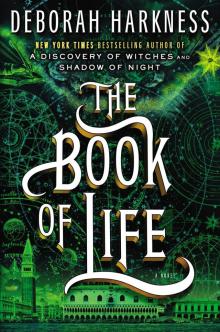 The Book of Life
The Book of Life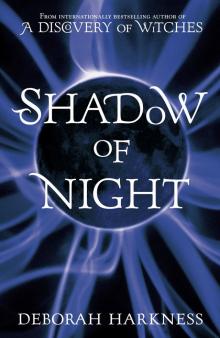 Shadow of Night
Shadow of Night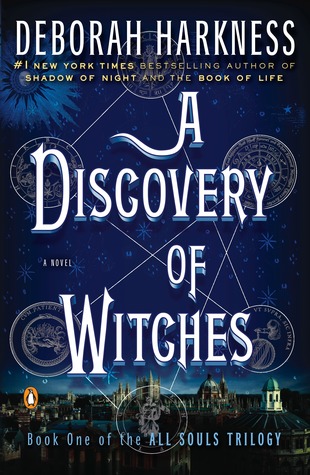 A Discovery of Witches
A Discovery of Witches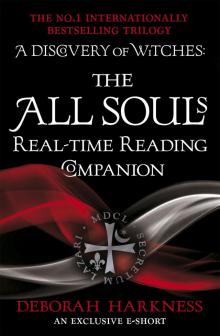 The All Souls Real-Time Reading Companion
The All Souls Real-Time Reading Companion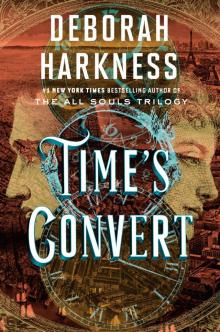 Time's Convert
Time's Convert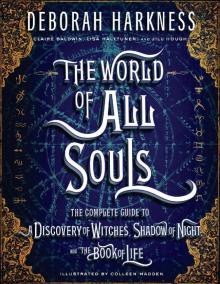 The World of All Souls
The World of All Souls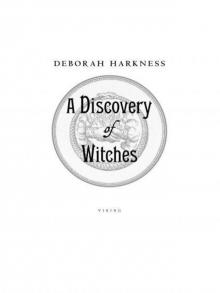 A Discovery of Witches: A Novel (All Souls Trilogy)
A Discovery of Witches: A Novel (All Souls Trilogy)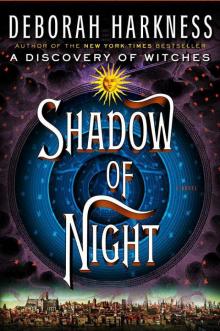 Shadow of Night: A Novel
Shadow of Night: A Novel